| Carduus | |
|---|---|
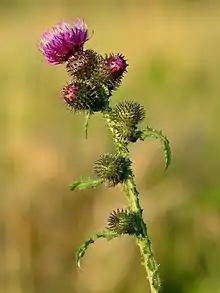 | |
| Carduus crispus | |
| Scientific classification | |
| Kingdom: | Plantae |
| Clade: | Tracheophytes |
| Clade: | Angiosperms |
| Clade: | Eudicots |
| Clade: | Asterids |
| Order: | Asterales |
| Family: | Asteraceae |
| Subfamily: | Carduoideae |
| Tribe: | Cardueae |
| Subtribe: | Carduinae |
| Genus: | Carduus L. |
| Species | |
|
90+, see text | |
| Synonyms | |
Carduus is a genus of flowering plants in the family Asteraceae, and the tribe Cardueae, one of two genera considered to be true thistles, the other being Cirsium.[1] Plants of the genus are known commonly as plumeless thistles.[2][3] They are native to Eurasia and Africa, and several are known elsewhere as introduced species.[3] This genus is noted for its disproportionately high number of noxious weeds compared to other flowering plant genera.[4]
Etymology
The genus name Carduus is from the Latin for "a kind of thistle"[5] or "thistlelike plant".[3] It is related to the word Cardonnacum ("a place of chardons or thistles"), which is the origin of Chardonnay, the name of the grape variety.[6] It is also related to the word card, which as a noun means a device (often a stiff-bristled brush) for aligning and cleaning fibers, and as a verb means the action of processing fibers in that way.
Description
These are usually annual or biennial herbs, sometimes perennial. Species often grow 2 meters in height but are known to reach 4 meters. The erect stems are winged and spiny, and usually have woolly hairs. The leaf blades are hairy to hairless and entire or divided into lobes, and they have spine-toothed edges. The flower heads are solitary or borne in inflorescences of up to 20. The head is spherical to cylindrical and covered in several layers of spreading or curving spine-tipped phyllaries. It contains long, tubular disc florets in shades of white, pink, or purple. The fruit is a cypsela tipped with a pappus of barbed bristles or scales.[3]
Ecology
Several Carduus are notorious invasive plants outside their native range, for example, in Australia[7] and the United States.[8] Species such as C. acanthoides, C. nutans, C. pycnocephalus, and C. tenuiflorus easily become weedy in disturbed habitat, such as overgrazed pasture. C. nutans is allelopathic, producing compounds that inhibit the growth and development of other plants.[8]
Agents of biological pest control that have been used against weedy Carduus thistles include the thistle head weevil (Rhinocyllus conicus), thistle crown weevil (Trichosirocalus horridus), and thistle crown fly (Cheilosia corydon). The musk thistle rust (Puccinia carduorum), a fungus, may also be used against C. nutans.[8]
Diversity
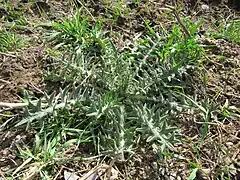
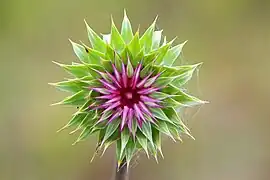
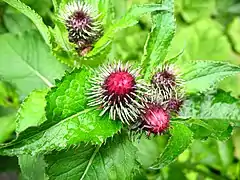
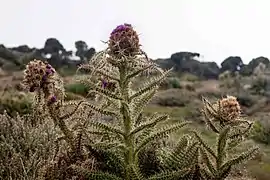 Carduus keniensis
Carduus keniensis
There are about 90[3] to 127[9] species in the genus.
Species include:
- Carduus acanthocephalus
- Carduus acanthoides – spiny plumeless thistle
- Carduus acicularis
- Carduus adpressus
- Carduus affinis
- Carduus afromontanus
- Carduus amanus
- Carduus angusticeps
- Carduus arabicus
- Carduus argentatus
- Carduus argyroa
- Carduus asturicus
- Carduus aurosicus
- Carduus axillaris
- Carduus baeocephalus
- Carduus ballii
- Carduus bourgaei
- Carduus bourgeanus
- Carduus broteroi
- Carduus budaianus
- Carduus candicans
- Carduus carduelis
- Carduus carlinoides
- Carduus carpetanus
- Carduus cephalanthus
- Carduus chevallieri
- Carduus chrysacanthus
- Carduus clavulatus
- Carduus corymbosus
- Carduus collinus
- Carduus crispus – curly plumeless thistle, curled thistle, welted thistle
- Carduus dahuricus
- Carduus defloratus
- Carduus edelbergii
- Carduus euboicus
- Carduus fallax
- Carduus fasciculiflorus
- Carduus fissurae
- Carduus getulus
- Carduus hamulosus
- Carduus hazslinszkyanus
- Carduus hohenackeri
- Carduus ibicensis
- Carduus jordanii
- Carduus juratzkae
- Carduus keniensis
- Carduus kerneri
- Carduus kirghisicus
- Carduus knorringianus
- Carduus kumaunensis
- Carduus lanuginosus
- Carduus leptacanthus
- Carduus leptocladus
- Carduus litigiosus
- Carduus lobulatus
- Carduus lusitanicus
- Carduus macracanthus
- Carduus macrocephalus
- Carduus malyi
- Carduus maroccanus
- Carduus martinezii
- Carduus membranaceus
- Carduus meonanthus
- Carduus millefolius
- Carduus modestii
- Carduus myriacanthus
- Carduus nervosus
- Carduus nigrescens
- Carduus nutans – musk thistle, nodding thistle
- Carduus olympicus
- Carduus personata
- Carduus pycnocephalus – Italian thistle, Italian plumeless thistle, compact-headed thistle
- Carduus ramosissimus
- Carduus schimperi (may include C. platyphyllus and C. chamaecephalus)[10]
- Carduus tenuiflorus – sheep thistle, shore thistle, slender thistle
- Carduus textorisianus Marg.
- Carduus uncinatus
- Carduus weizensis
- Hybrids
- Carduus × aragonensis
- Carduus × arvaticus
- Carduus × camplonensis
- Carduus × cantabricus
- Carduus × cyrneus
- Carduus × ipe
- Carduus keniensis × C. platyphyllus[11]
- Carduus × leridanus
- Carduus × orthocephalus
References
- ↑ Jordon-Thaden, I. E. and S. M. Louda. (2003). Chemistry of Cirsium and Carduus: a role in ecological risk assessment for biological control of weeds? Biochemical Systematics and Ecology 31(12), 1353-96.
- ↑ Carduus. Integrated Taxonomic Information System (ITIS).
- 1 2 3 4 5 Carduus. Flora of North America.
- ↑ Schmidt, J. P. and J. M. Drake. (2011). Why are some plant genera more invasive than others? PLOS One 6(4), e18654.
- ↑ Carduus. The Jepson eFlora 2013.
- ↑ Chardonnay. Viticultural Information. UC Integrated Viticulture, University of California.
- ↑ Carduus. PlantNET. National Herbarium of NSW, Royal Botanic Garden, Sydney.
- 1 2 3 Genus Carduus. Encycloweedia. California Department of Food and Agriculture.
- ↑ Carduus. The Plant List.
- ↑ Beentje, Henk (2000). Compositae, Part 1 (Flora of Tropical East Africa). Kew Botanical Garden.
- ↑ Young, T. P. and M. M. Peacock. (1985). Vegetative key to the alpine vascular plants of Mount Kenya. Journal of the East African Natural History Society 185, 1–9.
External links
 Media related to Carduus at Wikimedia Commons
Media related to Carduus at Wikimedia Commons- Carduus. In: Greuter, W. & E. von Raab-Straube. (Eds.) Compositae. Euro+Med Plantbase. 2006.
- Carduus (a genus of thistles). BioImages: The Virtual Field-Guide (UK). Accessed 2013-02-17.